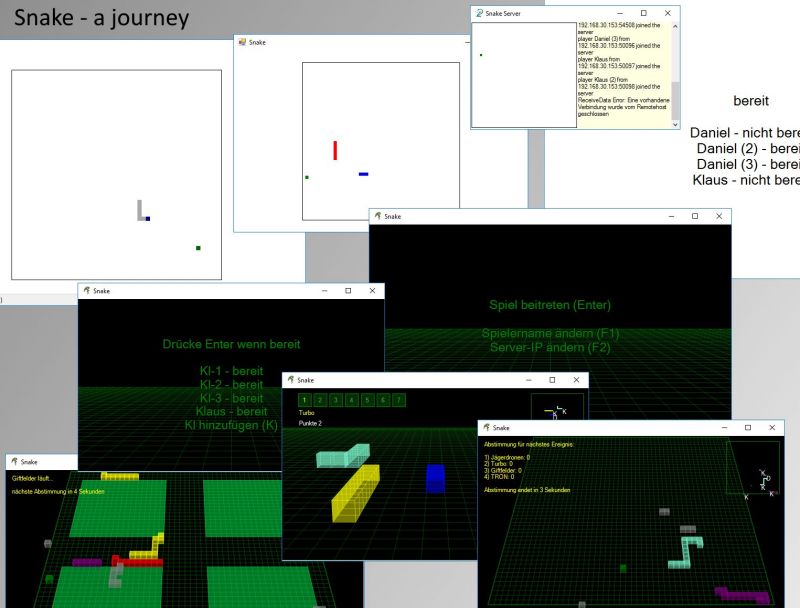Join devRant
Do all the things like
++ or -- rants, post your own rants, comment on others' rants and build your customized dev avatar
Sign Up
Pipeless API

From the creators of devRant, Pipeless lets you power real-time personalized recommendations and activity feeds using a simple API
Learn More
Search - "3d in a 2d engine"
-
Coolest thing i've built solo? I think it's my 3D snake multiplayer game.
It all started with a simple 2D snake game to teach programming basics at community college. Then i added a multiplayer mode based on a simple UDP implementation. Then i wondered how it would look ike in 3D and i had the idea to figure out how to implement a 3D engine by myself and i dove into the maths and wrote a simple 3D engine based on a windows forms picture box.
I showed the game to my colleagues and the loved it and we played it a lot.
So i added special mode boosters, and sound and map events and obervermode and observer polls.... you know it.
Here's a little collage of the journey... 8
8 -
My first dev project was making a small 3D engine in GameMaker 7 when I was 14. I had been using gamemaker for two years then but I never got past the "platformer movement and collisions" and "top down movement and collisions"
It was the first thing I made myself without following a tutorial and spend quite a few afternoons at school to ask my Math teacher to explain things like sin cos and tan. Words I saw on the internet but did not understand.1 -
First post here...Here's a funny thing that happened to me yesterday. I'm with my friend, we're both taking a break from school, and he comes up to me and mentions how he wants to make 3d games. Conversation goes a bit like this:
Friend: "Hey, I found this 3d model website. I'm thinking of using it for my 3d game."
He was already making a 2d game at this point, so I assumed he just gave up on it.
Me: "Well...do you have Unity?"
Friend: "Yes."
Me: "Well if you're going to make a game on there [stuff about c#]"
Friend insists he can easily make this. I tell him it would take years on end to learn C# and make a good game with it. And then he says something I never wanted to hear.
Friend: "Actually, no. You ever heard of Dani? D-A-N-I? He made a game in 2 weeks. He's actually making a new game and you should wishlist it on steam blah blah yatta yatta."
This guy believed someone else who was previously a game developer (if i recall) learned an entire programming language and engine in two weeks. He could've, but to me that seems seriously outrageous to someone who doesn't even know a smidge of programming.
He then advertised his YouTube channel and his games and brought down my arguments like "he probably had previous knowledge" completely. This guy doesn't even know where to start with C#. Really, all I could do after that was mention three.js (oh wow another JavaScript library, exciting), show him a game Google made with said library, and then said good luck...
Worst thing is, he uses Scratch to make games. And he genuinely thinks that is a real programming language.
That's it for my first post, thank you very much for reading :)6 -
A question to game devs : which design/architecture patterns do you use ?
Everytime I try to take a look at game development, I feel like there is a lack of guidelines, mostly about architecture.
It's something strange to me as a web dev, as we use much of these patterns on a daily basis. Of course I think about the near omnipresence of MVC and its variants, but not just that. Most of frameworks we do use are essentially focused on architecture, and we litterally have access to unlimited tutorials and resources about how to structure code depending on projects types ans needs.
Let's say I want to code a 2D RPG. This has been done millions of time across the world now. So I assume there should be guidelines and patterns about how to structure your code basis and how to achieve practical use-cases (like the best way to manage hero experience for example, or how to code a turn-based battle system). However I feel these are much harder to find and identify than the equivalent guidelines in the web dev world.
And the old-school RPG case is just an example. I feel the same about puzzle games or 3D games... Sure there are some frameworks and tools but they seems to focus more on physics engine and graphic features than code architecture. There are many tutorials too, but they are actually reinforcing my feeling : like if every game developer (at least every game company) has his on guidelines and methods and doesn't share much.
So... Am I wrong ? Hope to.
What are the tools and patterns you can reuse on many projects ? Where can I find proper game architectures guidelines that reached consensus ?6
